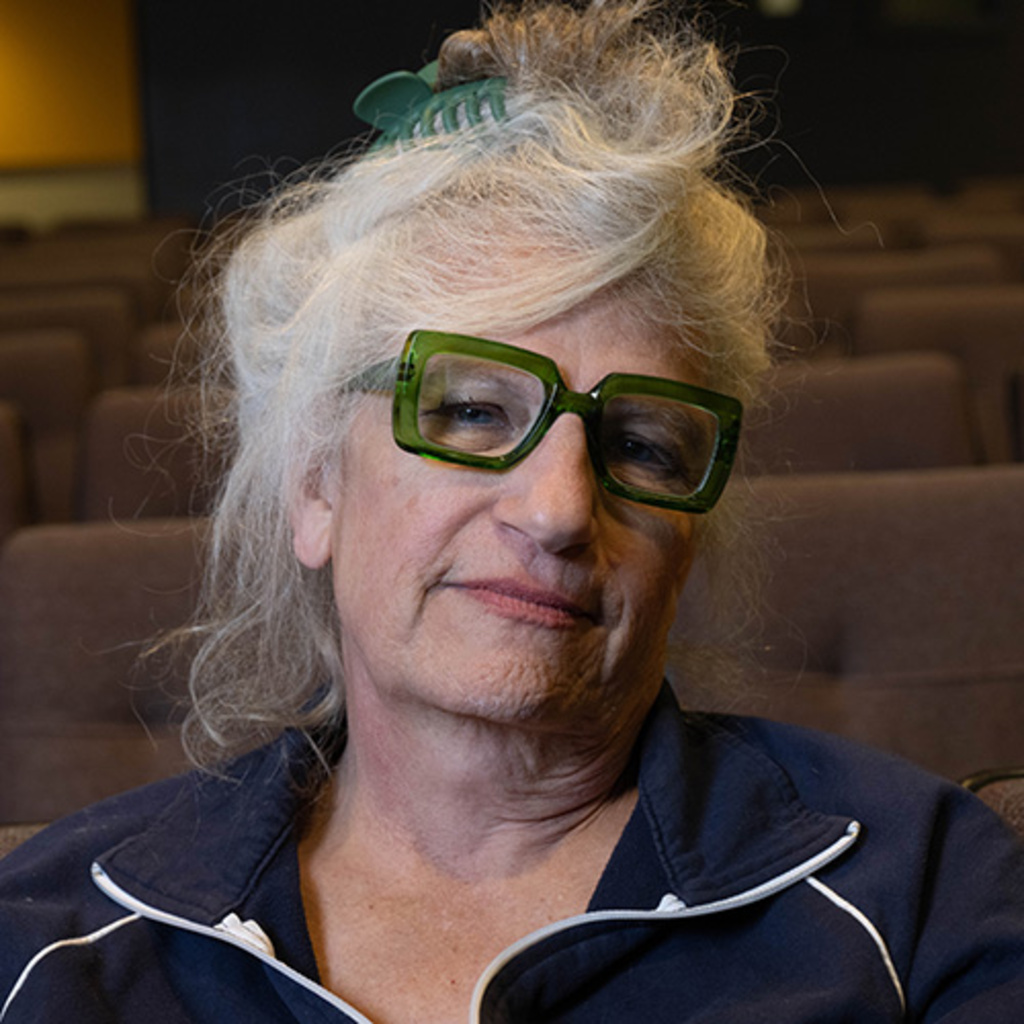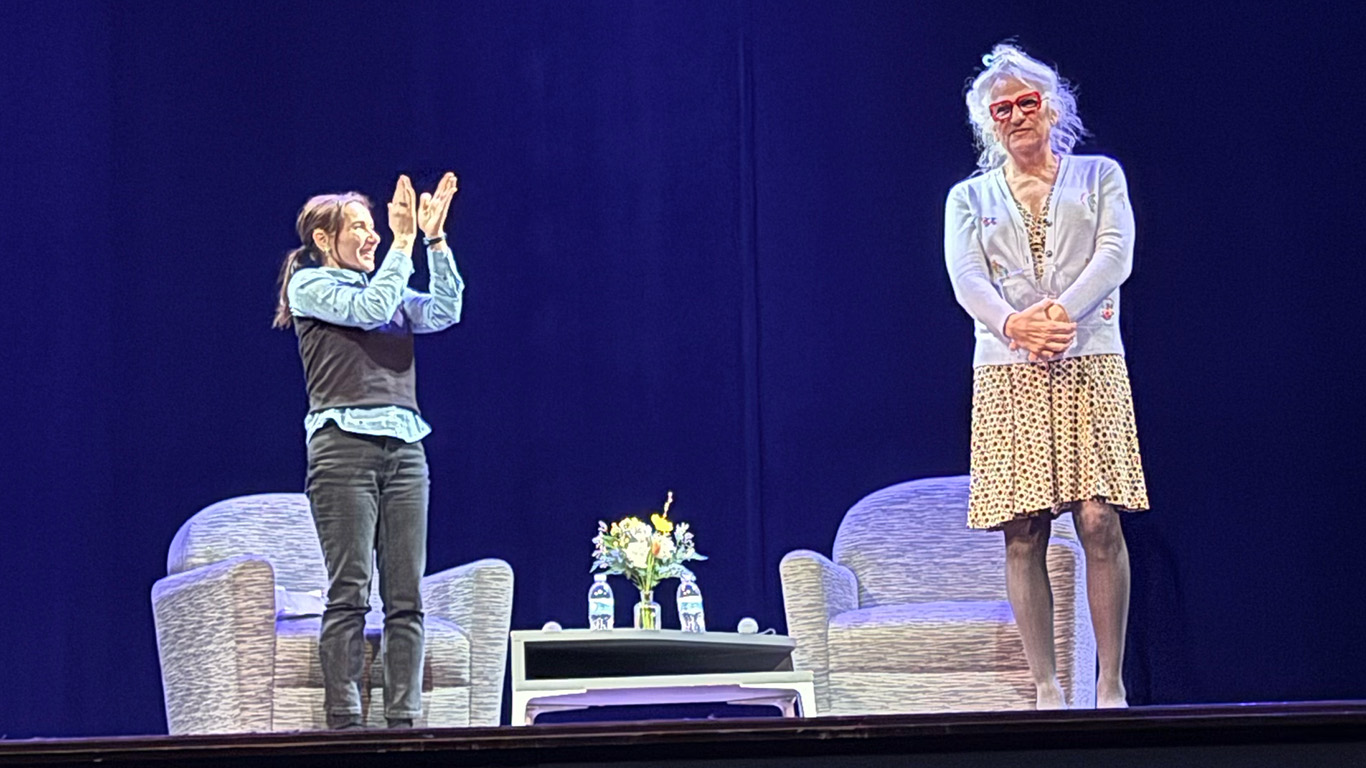The Emmy Award–winning writer who penned sketches for Saturday Night Live might have pursued another career had it not been for a class she took at the University of Iowa.
Story: Sara Epstein Moninger
Photography: Tim Schoon
Published: March 14, 2025
Growing up in the literary environment of Iowa City, Harper Steele decided she was going to be a writer. Her parents were part of the English faculty at the University of Iowa, after all, and she had babysitting gigs for authors John Irving and David Morrell.
Unfortunately, Steele was also a C student, one who didn’t receive much encouragement. Her papers in junior high and high school were handed back covered with red marks noting bad spelling, grammatical errors, and poor sentence structure. But she persisted.
“Something inside me said I was going to be a writer,” says Steele, who enrolled at Iowa and earned a BA in English in 1985. “I’m thankful that I had a passion like that pretty early on, because a lot of people don’t.”
At Iowa, Steele took a writing class that was geared toward students without a background in writing — and that’s where she received the motivation to pursue her dreams.
“On the first day, the teacher said, ‘We’re not going to ever correct any spelling or grammar,’ and there was a sigh of relief. And I wrote. That class basically changed my life,” she says. “If I taught writing, that’s how I would teach it, because I am a professional writer and I’ve been doing it for 35 years. I make money at it. I’m not angry at those people who put red marks on my paper. That’s the way they taught writing, but there are lots of ways to write.”
“That writing class I took at Iowa opened a whole world for me. I decided that I could become a writer after that class, which is truly absurd given my experience in grammar school and high school.”
Decades after finding that inspiration in a UI classroom, Steele’s credits include 13 years as a writer at Saturday Night Live, the sketch comedy show for which she earned a Primetime Emmy Award for Outstanding Writing for a Variety Special. She went on to serve as creative director for the comedy website Funny or Die and write the films Casa De Mi Padre, A Deadly Adoption, and Eurovision Song Contest: The Story of Fire Saga.
Recently, Steele was the subject of the 2024 documentary Will & Harper along with longtime friend Will Ferrell, whom she met when they both started working at Saturday Night Live the same week in 1995. The film follows the pair’s cross-country road trip not long after Steele came out to her friends as a trans woman. It premiered at the Sundance Film Festival and won awards for best documentary at the Critics’ Choice Documentary Awards, the Florida Film Critics Circle, and the Austin Film Critics Association. It also was named among the year’s top five documentaries by the National Board of Review.
The UI Lecture Committee invited Steele to campus for an event in March 2025, and she set aside time to talk about her upbringing in Iowa City, her writing style, and what it’s like behind the scenes at Saturday Night Live.
You were at Saturday Night Live for 13 years, including four as head writer. How did you land there?
I had another job in New York that didn’t last, but I stayed there and got hired by The Jon Stewart Show on MTV. That lasted a couple of years, and it ended up being the very moment SNL was cleaning house and looking for cool new writers. In 1995, I walked in there the same week as Will Ferrell, the same week as a lot of great people. As with anything in entertainment, it was a combination of timing and luck. Yes, you have to have the skills to stay there, but it was good timing.
You were nominated for an Emmy four times at SNL, winning in 2002. What skills does it take to achieve that kind of success?
Well, first, you have to be a good writer. Everyone thinks they can write for Saturday Night Live. Everyone thinks they’re funny. But it takes skills. It takes discipline. I’m kind of a lazy writer, but I worked very hard, and a lot of writers don’t understand that. When people tell me they want to work in comedy, I ask them if they write. Because that’s a thing you have to do. You have to like writing, and I like writing. I think you can learn to write comedy, but there’s an innate thing too. The best comedians have a comic lens that they look through, and it’s probably been there since they were children.
Do you feed off other writers when you’re doing sketch comedy?
I don’t ever write with people. I write with Will sometimes, but that’s more collaborating than writing. We’ll sit down and make an outline, and then I’ll do the writing. He’ll come back and have notes or change things, but I’m a control freak in that regard. At SNL, lots of people teamed up in groups and sat in offices together and laughed, and I sat by myself and wrote.
But I did do a sketch called “The Ladies Man” — and, later, the movie — with a writing partner, Tim Meadows. So, I have done it, but it’s not my preferred way of writing. I like writing by myself. That said, I do feed off people. When you’re in a room with people like Tina Fey and Paula Pell and everyone’s doing bits and being funny, how can you not be inspired?
What would surprise people about this kind of work?
It’s not fun sometimes. SNL is a grind. Colin Quinn used to say, “After you get a sketch on Saturday — which is not a given, it’s a competitive thing — what do you win? Another pinball game.” It’s not like you won. The next week’s coming and you have to do it again. It’s a very competitive, very anxiety-ridden environment. I was very happy and unhappy there, and everyone will tell you the same thing: It can be a very tense, very hard place to make a living, but it’s full of joy and fun as well. But it’s work. It’s a job. It’s always a job. Then you get to LA and you’re writing screenplays and someone’s paying you for it, and there are deadlines. If you don’t like writing college papers, this is five times worse.

Campus group honors Steele as ‘Notable Iowan’
The University of Iowa Lecture Committee, which has brought some of the world’s great thinkers to campus for more than 100 years, hosted UI alumna and writer Harper Steele for a talk at the Englert Theatre in March, and named her the recipient of its 2024–25 Notable Iowan Award.
The award honors individuals with strong ties to Iowa who have produced an extensive body of work that has significantly and positively impacted society and who serve as role models for others. The committee found that Steele, who spent 13 years at Saturday Night Live and won an Emmy Award for her work, met and exceeded these requirements.
Each year, the Lecture Committee hosts from six to 10 lectures. While membership includes faculty and staff, students oversee and organize the events, performing all tasks, from booking speakers and hotel rooms to coordinating publicity and media coverage. Speakers have included national and international figures in science, politics, business, human rights, law, and the arts.

University of Iowa English professor and author Melissa Febos applauds while standing on the Englert Theatre stage with Harper Steele. Febos moderated Steele's University of Iowa Lecture Committee appearance in Iowa City on March 10, 2025. Photo courtesy of UI Lecture Committee.
Going back to the joy, what do you find most rewarding?
If I’m in a zone writingwise, if I’m really feeling it, that’s pure joy. That’s me laughing to myself like a crazy person. That’s me in my apartment, in my office, on the bus by myself with people looking at me. If I have a good idea, there are people I can turn to — Kristen Wiig, Will Ferrell, Tim Meadows, my friends from Iowa City. If I’m around them, it’s joy. I get ideas, they get ideas. We are just feeding off each other. That’s very joyful for me.
What do you like to read?
I’m all over the place. I’m reading a lot of old psychology textbooks now because I love the language. I read a lot of Harlequin romance books. I read things that are not considered good literature because I like the parody or the way the language comes together. I just read a book called Still Life from a trans author, and I read Elliot Page’s memoir. I read all the time.
What’s next for you?
I’m flogging through a memoir. It’s supposed to be funny but it’s hard work. It’s not a style of writing that I know, but that’s the challenge. That’ll be fun. I also have a thing I’m doing with Netflix. I never stop. I have spec scripts that I’ve written that I would like to see get done. I have a project with Kristen Wiig, but it’s only a script. I’m on page 45, but I have to put it aside for these other things. I’ll get back to that at some point.
One of the key takeaways from Will & Harper is that you have a really solid friendship with Will Ferrell.
Yes, the movie is not heavily laden with a lot of politics. It enters politics a bit, because we’re in that place in our country right now, but it’s really more about friendship and how people navigate change. It could be any kind of change. We could have been going across the country with an entirely different issue and dealing with that. The emphasis is more on how friends deal with changes in each other’s lives, which I think is very special.
What would you say to someone who is considering the University of Iowa?
I think the environment is fantastic. I have three kids who all went to private schools, and they turned out great, but I liked being at a big university. You can be a weirdo in your high school, and you will find other weirdos like you in a school of 30,000 people. It’s very diverse, very open. You’re going to find your group. Many of my best friends, even in the entertainment industry, I met at Iowa. The joy of finding your group in a place like Iowa is that group becomes one of your stronger friend groups moving forward, no matter what you’re doing. I had a like-minded circle of friends there, and half of us are in LA right now working.
How has your Iowa education affected your worldview?
Midwesterners stereotypically are even-keeled, a little kinder, I think, and that plays out for me as an Iowan. My influences were Carol Burnett, Tim Conway, a kinder comedy. I’m not a very mean comedian. I like silly comedy, and I think that came out of Iowa itself or my growing up in Iowa.
That writing class I took at Iowa opened a whole world for me. I decided that I could become a writer after that class, which is truly absurd given my experience in grammar school and high school. There was no way. This is why I like coming back. When Iowa asks me to do things, I generally try to do them if I can. I love this school.
